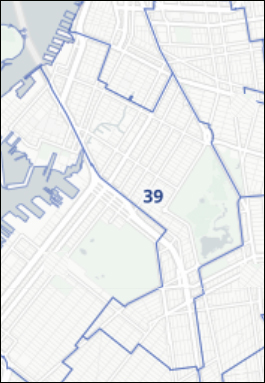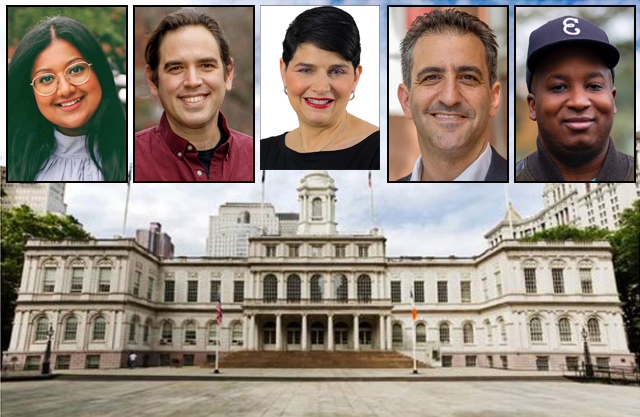Earlier this year, Streetsblog did a roundup of a dozen council races in Brooklyn, most of which had one or two candidates who would attract the support of the livable streets movement. But we knew that many candidates would claim the "Streetsblog" mantle in the 39th Council District — which comprises Park Slope, Carroll Gardens, Windsor Terrace and Kensington, and is currently represented by Brad Lander, who succeeded a former school board member named Bill de Blasio. So here's our preview of that race.
One candidate wants to daylight hundreds of street corners. Another wants a car-free busway on Union Street from Grand Army Plaza to Columbia Street. And another wants to decarbonize the entire city.
Relax, Brad Lander fans — the 39th Council District appears to be in good hands.
Here are the candidates (in order of total cash on hand, from most to least):
- Doug Schneider, lawyer and longtime political activist.
- Justin Krebs, theater artist and producer and political organizer.
- Shahana Hanif, community organizer and former Lander staffer.
- Brandon West, former staffer at the Mayor’s Office of Management and Budget and the City Council.
- Mamnun Haq, labor organizer (no contact information available).
- Briget Rein, former teacher and union leader.

First, let's get down to business: In 2019, there were 3,574 reported crashes, injuring 142 cyclists, 165 pedestrians and 546 motorists. That's roughly 10 crashes every day.
All the candidates talk about street safety, but only one, Doug Schneider, is putting it front and center, listing it as one of his two top priorities (he did not say what the other one was and we didn't ask).
On Monday, Schneider is expected to release a full white paper on his transportation plan, which includes everything you'd expect from a Park Slope progressive: more bike lanes, more dedicated bus lanes, and more open streets.
In short, as the plan says, he favors "eliminating the traffic behaviors that put bikers and pedestrians at risk; significantly expanding automated enforcement measures; increasing sidewalk and crosswalk safety and accessibility; expanding open streets; and, ensuring public transportation is 100 percent accessible for everyone."
Specifics include "districtwide" daylighting of corners, split-phase light timing at some dangerous intersections, more enforcement of placard abuse, and instituting off-hours deliveries.
"The 39th District has seen an epidemic of traffic violence," Schneider told Streetsblog. "There have been way too many funerals and especially too many funerals for children. There are few things more important than safe streets and safe sidewalks."
But where the rubber hits the road, Schneider, who does drive, did reveal a bit of sympathy for the neighborhood's car owners and their constant complains about "the parking problem," as he put it.
For instance, Schneider is not convinced about the Department of Transportation's residential loading zone program, which is the agency's quiet effort to unclog side streets by removing several parking spaces so that the ubiquitous Amazon and Fresh Direct trucks can pull to the curb for fast unloading.
Schneider said if he sees data that the pilot program works (and it does!), he'll advocate for it strongly — as long as it's part of "a long-term strategic plan" that rolls out improvements in the proper order.
"In order to get people to move from a car-based culture, we have to prove to them that they can get around this city under every scenario imaginable using other transportation options quickly and efficiently," he said. "People will be willing to give up their car if you can show them that they can take a bus from Park Slope to Columbia Street in 15 minutes instead of the hour and 15 it would take now. To do that, you have to take away parking, so there's a chicken-and-egg thing of which one you do first."
One of Schneider's challengers, Briget Rein, doesn't need a poultry analogy to know where she stands one transit issue: She's advocating for a car-free busway on Union Street from Grand Army Plaza to Red Hook — a revolutionary proposal modeled after the 14th Street busway.
"I'm set on this plan," she said. "It will be great for cyclists, transit riders and walkers — and for the small businesses. I hope the community will support it. I will never do anything without talking to my community. I don't do edicts. I'm not like that. If people are against it, we have to sit down and talk. I will present a clear argument why this could work and why the community should help me to develop it. But at the end of the day, I get shit done." (None of the other candidates in the race have a specific car-free transit proposal, though Hanif said she would support one on Church Avenue.)
Rein also apologized for her campaign's greatest misstep so far: Back in December, she tweeted that she would require cyclists to wear helmets — a rule that would greatly diminish cycling and have the unintended consequence of making bike riders less safe, according to science.
"Yeah, that was bad and I retracted it," she said. "I initially said it because I kinda worry about the Citi Bike users [most of whom do not wear helmets]. But I saw what people said and it was valid, so I changed my position. I want to encourage my community to continuously use bikes. The helmet is a personal feeling for me, though. I believe it is safer. And if we encourage our children to do it, we should model it. But I would not require them."
Meanwhile, as a survivor of Lupus — and a double-hip replacement recipient — Shahana Hanif is positioning herself as the race's most vocal supporter of transit accessibility (though all the candidates favor it, naturally). Her broader platform calls for a "feminist Green New Deal" plus support for taxi drivers in a way that would "decarbonize" the city. In a 30-minute conversation with Streetsblog, she frequently used the verb "pedestrianize," but when pressed, said she wasn't specifically advocating for car-free streets, but for the conversion of vacant lots into community spaces.
"I love that we have the open streets initiative, but it needs to be permanent," she said. "It shouldn't be that we only expand outdoor space because of COVID. So I look around: where else do we have vacant lots that can be spaces for people? We need a mechanism to encourage stewardship through a green jobs initiative, so we don't have police patrolling open streets. I'm proposing an open streets stewardship program."
Unlike Schneider, she is very aggressive on the "parking problem."
"We've internalized the importance of parking space and we have not pushed back enough," she said. "We are going to need leadership. I understand there will be opposition, so that means I need to double down on making sure our transit is accessible. We have not done enough to reduce our carbon footprint and have an infrastructure that makes it easy to get around cleanly."
Krebs also seemed eager for a fight with car owners. In fact, he pointed out unprovoked that he was talking to Streetsblog from a restaurant table that had been repurposed from a so-called parking space.
"Taking streets for arts, culture, gatherings, that's what makes us have vibrant neighborhoods and transportation is part of that," said Krebs, best known for starting the Manhattan theater space, The Tank. "I see the city over handlebars, so I start with how we engage and use the commons of our city. The vision is superblocks like in Barcelona."
"I won't pretend to know which parking spaces need to disappear, but I do know that a bunch of them do have to disappear," he said. "The key is to listen to good folks, and I listen to Families for Safe Streets and Riders Alliance, for example. If I'm elected and four years go by and we don't get significant changes, I should be kicked out."
West also said he would talk to all the right people, but was also keenly aware that not all stakeholders are honest brokers.
"You have to know when to not listen to people," said West, whose agenda is titled, "A Better City is Possible." "Some people with access and resources use that to leverage their needs."
He didn't offer a specific route for a car-free busway, but said he supported one.
"The research and the data and the need to be equitable is incredibly important. We just have to do it. I'll take the hit," he said. "We fought forever to get even a little done, and then the pandemic came, and we did open streets and open restaurants — and it was clearly the right move. So we need to do more."
West's policy agenda is dominated by his desire to truly reform the NYPD, which carries out "an unending parade of indignity and violence, inflicted with impunity on working class Black and brown New Yorkers." He would cut the NYPD budget in half. (Schneider and Hanif also advocate for serious police reform.)
West said police violence is the major problem, but also the complete disregard cops have for cyclists.
"They clearly don't care," he said. "We all know someone who has been doored or in a crash, and they say interacting with the police ends up being the worst part. It's the lowest of low priorities for them. So we need defunding and alternatives to policing."
And, he added, "we need to get rid of free parking."
"The long-term goal is to actually build a 15-minute city," he said. "I want to Barcelona and it's a completely different world — those superblocks. The city wasn't built that way. They added it. We can, too."






